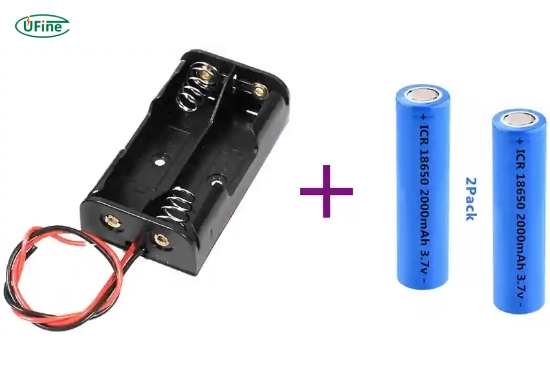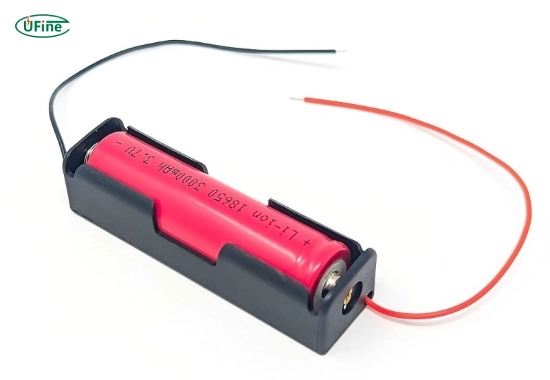
- Part 1. What is a battery holder?
- Part 2. Why is choosing the right battery holder important?
- Part 3. What types of lithium batteries need holders?
- Part 4. What sizes of lithium cells are most common?
- Part 5. How do you match a battery holder to your lithium cell?
- Part 6. What materials are best for battery holders?
- Part 7. What safety features should a battery holder have?
- Part 8. Should you choose a pre-wired holder or PCB mount?
- Part 9. How to install a battery holder safely?
- Part 10. Where to buy reliable battery holders?
- Part 11. FAQs about battery holder
- Part 12. Final thoughts
Choosing the right battery holder for lithium cells is essential for ensuring your power system’s safety, performance, and longevity. Whether building a DIY electronics project or designing a commercial product, the battery holder you choose influences how well your lithium batteries work.
This guide will explain everything you need about battery holders, including types, materials, size compatibility, and safety features. You’ll also learn how to avoid common mistakes and get answers to frequently asked questions.
Part 1. What is a battery holder?
A battery holder is a device that securely holds one or more batteries to connect them to an electrical circuit. It provides the necessary housing, electrical connections, and sometimes battery protection features.
Choosing the right holder is even more critical for lithium cells, which are powerful and sensitive to mishandling.
Artikel Terkait: The Ultimate Guide to 18650 Battery Holders
Part 2. Why is choosing the right battery holder important?
A poor-quality or mismatched battery holder can lead to:
- Loose connections
- Short circuits
- Overheating
- Battery damage
- Fire hazards
Lithium batteries have high energy density, meaning they can deliver much power in a small package. However, they also require proper handling and secure mounting.
Part 3. What types of lithium batteries need holders?
Not all lithium batteries are the same. Here are the most common types that require holders:
- Lithium-ion (Li-ion) – Rechargeable and used in laptops, power tools, and more.
- Lithium polymer (LiPo) – Lightweight, used in drones and RC vehicles.
- Lithium iron phosphate (LiFePO4) – Safer and longer-lasting, used in solar and electric vehicles.
- Primary lithium cells (non-rechargeable) – Used in watches, remotes, and medical devices.
Each type may require a different holder design based on shape, voltage, and use case.
Part 4. What sizes of lithium cells are most common?
Here are some popular sizes that often need holders:
- 18650 – Cylindrical, rechargeable, often used in flashlights and laptops.
- 21700 – Larger than 18650, used in power tools and electric cars.
- CR123A – Compact and used in cameras and security systems.
- Coin cells (like CR2032) – Flat, round, used in small electronics.
Each size needs a holder explicitly designed for that shape and contact point.
Part 5. How do you match a battery holder to your lithium cell?
To correctly match a battery holder to your lithium cell, follow these steps:
- Identify the battery size: Check the model number (18650 or CR2032).
- Determine the number of cells: Will you use one or multiple batteries?
- Choose the configuration: Series (to increase voltage) or parallel (to increase capacity)?
- Check polarity protection: Many holders have features to prevent reverse insertion.
- Consider mounting method: Through-hole, surface mount, or panel mount?
- Evaluate material quality: Look for holders with heat-resistant plastics and nickel-plated contacts.
✅ Quick Tip: Always get a holder labeled explicitly for lithium cells. Don’t reuse holders designed for AA or alkaline batteries.
Part 6. What materials are best for battery holders?
High-quality battery holders should be made from heat-resistant plastics such as:
- ABS (Acrylonitrile Butadiene Styrene)
- Nylon
- Polycarbonate
For the contacts, look for:
- Nickel-plated steel for good conductivity
- Phosphor bronze or beryllium copper for better spring tension
Avoid cheap materials. They may warp under heat or become brittle over time.
Part 7. What safety features should a battery holder have?
Safety is key when working with lithium cells. Look for holders with:
- Reverse polarity protection
- Short-circuit prevention
- Overcurrent protection
- Secure locking mechanism
- Heat-resistant casing
If you’re working with high-power applications, you may want holders with built-in fuses or thermal cutoff switches.
Part 8. Should you choose a pre-wired holder or PCB mount?
There are two main types of holders based on how they connect to your circuit:
1. Pre-wired holders
- Come with wires already attached
- Easy to use for DIY or prototyping
- Good for quick assembly
2. PCB mount holders
- Solder directly onto printed circuit boards
- Ideal for compact and permanent installations
- Available in surface-mount or through-hole variants
Choose based on your project type and assembly method.
Part 9. How to install a battery holder safely?
Follow these steps:
- Disconnect power before installation.
- Double-check polarity markings.
- Use proper tools for soldering or mounting.
- Avoid touching metal contacts with bare hands.
- Secure the holder with screws or adhesive if needed.
- Test the connections with a multimeter.
⚠️ Warning: Never force a battery into a holder. If it doesn’t fit, it’s the wrong size.
Part 10. Where to buy reliable battery holders?
You can buy high-quality lithium battery holders from:
- Electronics component suppliers (like Digikey, Mouser, and RS Components)
- Online marketplaces (like Amazon, eBay – but check reviews)
- Maker stores (like SparkFun, Adafruit)
Always check product reviews and technical specifications before buying.
Part 11. FAQs about battery holder
Can I use an AA battery holder for 18650 lithium cells?
No. AA holders are not designed to handle the size, voltage, or current of 18650 cells. You must use a holder designed specifically for lithium batteries.
What is the difference between series and parallel battery holders?
Series holders increase the total voltage.
Parallel holders increase total capacity (mAh).
Choose the configuration based on your power requirements.
Can I charge lithium batteries while in the holder?
Yes, but only if the holder is designed for charging. Ensure it can handle the charging current and has proper contact materials. Constantly monitor charging to prevent overheating or swelling.
How do I know if a battery holder is safe for high current?
Look for:
- Thick wire gauge (like 20 AWG or lower)
- Nickel-plated contacts
- Secure gripping springs
- Manufacturer ratings for current (in amps)
Are metal battery holders better than plastic ones?
Plastic holders with metal contacts are standard. All-metal holders are rare and usually heavier. The key is not the material alone, but quality design and construction.
Part 12. Final thoughts
Choosing the right battery holder for lithium cells isn’t just about making your project work. It’s about making it safe, reliable, and long-lasting. Don’t cut corners. Always match your holder to the battery’s type, size, and application.
Use this guide as your go-to checklist when designing your next lithium-powered project. When in doubt, choose quality over price, especially when dealing with high-energy components like lithium batteries.
Related Tags:
More Articles

What are Watts and Watt Hours in Battery?
Understand watt vs watt-hour in batteries, how to calculate battery watt hours, and what Wh means for car batteries, devices, and energy storage.
A Complete Guide to the Best Batteries for Flashlights
Compare the best batteries for flashlights, including AA, AAA, 18650, 21700, CR123A. See which battery offers the best brightness, runtime, and reliability.
How Long Do Rechargeable AA Batteries Last?
How long do rechargeable AA batteries last? Compare NiMH and lithium AA lifespan, recharge cycles, key factors, and performance vs alkaline batteries.
How Much Current Can a 9V Battery Really Supply?
Discover how many amps a 9V battery can supply, its actual current output, discharge rate, and capacity for alkaline, lithium, and rechargeable 9V batteries.
12V STD vs 12V AGM: Meaning, Differences, and Which Is Better
Understand what STD and AGM batteries mean, their key differences, and which 12V battery fits your needs best in 2026.




